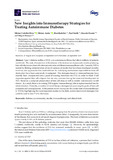Mostrar el registro sencillo del ítem
New insights into immunotherapy strategies for treating autoimmune diabetes
| dc.creator | Cabello Olmo, Miriam | es_ES |
| dc.creator | Araña Ciordia, Miriam | es_ES |
| dc.creator | Radichev, Ilian | es_ES |
| dc.creator | Smith, Paul | es_ES |
| dc.creator | Huarte, Eduardo | es_ES |
| dc.creator | Barajas Vélez, Miguel Ángel | es_ES |
| dc.date.accessioned | 2020-03-06T10:04:32Z | |
| dc.date.available | 2020-03-06T10:04:32Z | |
| dc.date.issued | 2019 | |
| dc.identifier.issn | 1422-0067 | |
| dc.identifier.uri | https://hdl.handle.net/2454/36405 | |
| dc.description.abstract | Type 1 diabetes mellitus (T1D) is an autoimmune illness that affects millions of patients worldwide. The main characteristic of this disease is the destruction of pancreatic insulin-producing beta cells that occurs due to the aberrant activation of different immune effector cells. Currently, T1D is treated by lifelong administration of novel versions of insulin that have been developed recently; however, new approaches that could address the underlying mechanisms responsible for beta cell destruction have been extensively investigated. The strategies based on immunotherapies have recently been incorporated into a panel of existing treatments for T1D, in order to block T-cell responses against beta cell antigens that are very common during the onset and development of T1D. However, a complete preservation of beta cell mass as well as insulin independency is still elusive. As a result, there is no existing T1D targeted immunotherapy able to replace standard insulin administration. Presently, a number of novel therapy strategies are pursuing the goals of beta cell protection and normoglycemia. In the present review we explore the current state of immunotherapy in T1D by highlighting the most important studies in this field, and envision novel strategies that could be used to treat T1D in the future. | en |
| dc.description.sponsorship | Miriam Cabello-Olmo was granted by the Industrial PhD program (Navarre Government) (Ref 001114082016000011). | en |
| dc.format.extent | 26 p. | |
| dc.format.mimetype | application/pdf | en |
| dc.language.iso | eng | en |
| dc.publisher | MDPI | en |
| dc.relation.ispartof | International Journal of Molecular Sciences, 2019, 20 (19), 4789 | en |
| dc.rights | © 2019 by the authors. Licensee MDPI, Basel, Switzerland. This article is an open access article distributed under the terms and conditions of the Creative Commons Attribution (CC BY) license. | en |
| dc.rights.uri | http://creativecommons.org/licenses/by/4.0/ | |
| dc.subject | Diabetes | en |
| dc.subject | Autoimmunity | en |
| dc.subject | Insulin | en |
| dc.subject | Immunotherapy and clinical trials | en |
| dc.title | New insights into immunotherapy strategies for treating autoimmune diabetes | en |
| dc.type | info:eu-repo/semantics/article | en |
| dc.type | Artículo / Artikulua | es |
| dc.contributor.department | Ciencias de la Salud | es_ES |
| dc.contributor.department | Osasun Zientziak | eu |
| dc.rights.accessRights | info:eu-repo/semantics/openAccess | en |
| dc.rights.accessRights | Acceso abierto / Sarbide irekia | es |
| dc.identifier.doi | 10.3390/ijms20194789 | |
| dc.relation.publisherversion | https://doi.org/10.3390/ijms20194789 | |
| dc.type.version | info:eu-repo/semantics/publishedVersion | en |
| dc.type.version | Versión publicada / Argitaratu den bertsioa | es |
| dc.contributor.funder | Gobierno de Navarra / Nafarroako Gobernua | es |



